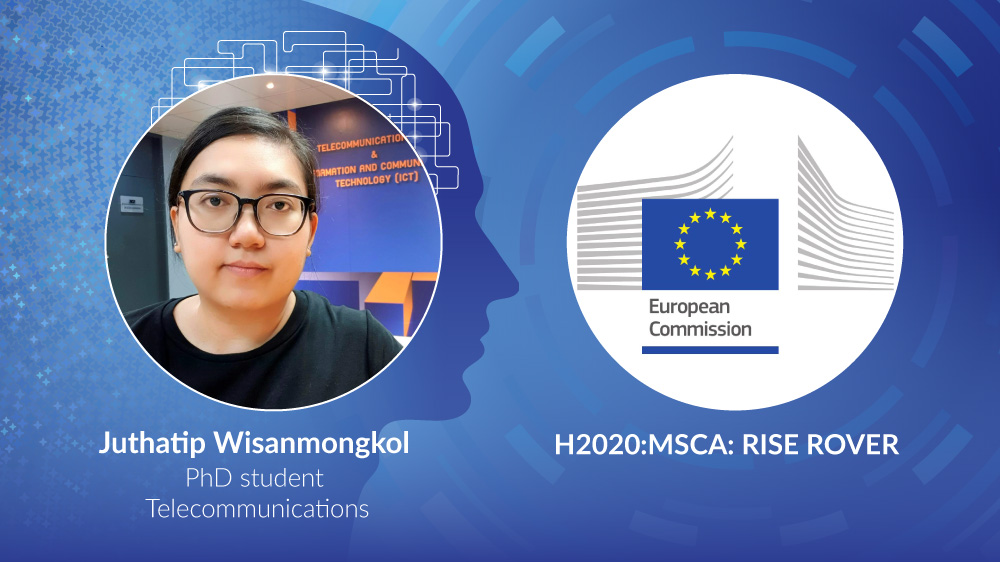By Nitipol Kiravanich and Mae Thiwari
March 25th, 2022 — A doctoral student, Juthatip Wisanmongkol, in Telecommunications Program at the Asian Institute of Technology (AIT), has taken a step further with her research on wireless communication technology. From locating objects indoor employing Deep Neural Network (DNN), the young researcher has recently been offered to work in Norway and Finland on the European Union (EU)’s funded project to locate colorectal cancer. Through a collaboration with AIT, the only university in Thailand, the EU grant to advance wireless sensor technology is available until October 2025.

Fascinated by how information can be transmitted wirelessly and the wide application of wireless communication, Juthantip chose to pursue her study in this field and became an assistant researcher at Thailand's National Electronics and Computer Technology Center (NECTEC), working on improving the systems of wireless indoor localization. Three years ago, when she decided to take a break from work to further her study on the subject, she chose to join AIT.
The Telecommunication Program at the School of Engineering and Technology (SET), like other programs in every school of AIT, has many collaboration projects and agreements with renowned universities and organizations around the world. For her studies on the wireless localization, Juthatip had an opportunity to work in collaboration with Australia’s Wollongong University to build on their existing data. The result is her recently published paper in the prestigious journal of the Institution of Engineering and Technology (IET), United Kingdom (UK), titled “An Ensemble Approach to Deep Learning-Based Wireless Indoor Localization"
Wireless localization or wireless positioning is a process of locating an object using radio waves. For example, to check stock of products in a large factory, the traditional methods of wireless localization would rely on hand-engineered models which might not be a good representation of the actual environment, and this in turn limits the localization accuracy.
A more contemporary method employs deep learning technique of machine learning, a type of Artificial Intelligence (AI), where the models are automatically extracted from the observed wireless signal itself. Based on this approach, better models are created, and the localization accuracy can be improved.
To do this, it requires complex knowledge of applied mathematics, which Juthatip already possesses, to work out the equations needed to teach the system to learn and interpret information by itself like human brain does, which Juthatip has learned more from AIT.
“I wanted to gain better knowledge and more experience in this field, to improve the work I do at NECTEC, so I chose to study at AIT,” Juthatip explained, adding that, “there’s a variety of courses that offer new perspectives from abroad to broaden and deepen my knowledge in wireless communication.”
In addition to locating objects, using wireless technology, the other part of Juthatip’s studies is locating a capsule inside human body, “which is more challenging, because there are many properties of human cells that obstruct or absorb wireless signal,” the wireless researcher highlighted. For this part, she and her advisor, Dr. Attaphongse Taparugssanagorn, have been invited to the Intervention Center at Oslo University Hospital in Norway, the largest hospital organization in Europe, as visiting scholars. The two will work on the EU’s H2020: MSCA:RISE ROVER project from May 1, 2022 – May 31, 2022 to advance wireless communication systems for intra-body sensor networks – a wireless communication technology that provides data from the human body to the medical devices.
After completing work at the Oslo University Hospital, Juthatip will continue to work on the project with the University of Oulu’s Center for Wireless Communications in Finland from June 1 – September 30, 2022. Her research there will focus on Wireless Capsule Endoscope Localization, which is new to her and she is excited about. Sharing her thought on this, the Telecommunications student noted that, “it is such a great motivation for me to push myself to go even further, because the work there will have an impact on people all over the world.”
AIT is among six partner universities of the EU-funded ROVER project, focusing on new wireless body-centric methods to improve patient care. From measuring body temperature and blood pressure to monitoring vital signs and providing real-time feedback, this technology can improve patient diagnostic procedures. The project is bringing together experts from eight countries to develop novel solutions and procedures, facilitating the commercialization of non-invasive on-body and in-body wireless technology innovations. It will develop a system architecture that draws on expertise in areas of engineering, physics, medicine, computer science and product development. Students of Telecommunications program at AIT are eligible to join the project which runs until October 31, 2025.
The Telecommunications Program offers areas of specialization in transmission systems; switching systems; telematics; network planning; and, in collaboration with AIT’s School of Management, telecommunications management. The courses also emphasize modern telecommunications skills in systems planning and engineering, telecommunications software development, and administrative and financial aspects of telecommunications management. For more information, please visit: https://set.ait.ac.th/programs/information-and-communications-technologies/telecommunications-tc/
Students may also choose to receive two degrees from the Dual Degree Program by studying with AIT and the University of Wollongong (UOW), Australia. The program provides students with knowledge and skills in fundamentals and applications on wireless networks, signal processing, estimation and detection techniques, Internet of Things (IoT), Artificial Intelligence (AI) embedded systems. For more information on International Dual Degree Program with University of Wollongong (Australia), please visit: https://set.ait.ac.th/programs/special-degree-programs/dual-degree-uow/
